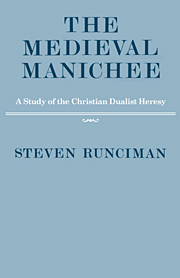Book contents
- Frontmatter
- Contents
- CHAPTER I Introduction
- CHAPTER II The Gnostic Background
- CHAPTER III The Paulicians
- CHAPTER IV The Bogomils
- CHAPTER V The Patarenes
- CHAPTER VI The Cathars
- CHAPTER VII The Dualist Tradition
- APPENDIX I The Greek Sources for Paulician history
- APPENDIX II Heretical Movements in the Eighth Century
- APPENDIX III Various Names given to the Dualist Heretics in Europe
- APPENDIX IV Dualism, Buddhism and Occultism
- BIBLIOGRAPHY
- ADDITIONS (1982)
- INDEX
CHAPTER VI - The Cathars
- Frontmatter
- Contents
- CHAPTER I Introduction
- CHAPTER II The Gnostic Background
- CHAPTER III The Paulicians
- CHAPTER IV The Bogomils
- CHAPTER V The Patarenes
- CHAPTER VI The Cathars
- CHAPTER VII The Dualist Tradition
- APPENDIX I The Greek Sources for Paulician history
- APPENDIX II Heretical Movements in the Eighth Century
- APPENDIX III Various Names given to the Dualist Heretics in Europe
- APPENDIX IV Dualism, Buddhism and Occultism
- BIBLIOGRAPHY
- ADDITIONS (1982)
- INDEX
Summary
IN Bosnia Dualism nearly reached the triumph of permanence, but its most spectacular achievements were made in Italy and in France. It was there that its growth most alarmed the Roman Church, and it was there that the Roman Church evolved the means for its suppression. The Inquisition fulfilled its object, but only as the result of careful organization and preparation; for which historians must be grateful. For, though the books of the heretics perished by its labours, the records of its trials and the inquisitors' manuals give us a far clearer picture of the Dualist Church than can be found elsewhere. It may be questioned how far evidence about the French or Italian dualists can be held to apply to the dualists of Bosnia, Bulgaria or Constantinople. The answer to that lies in the history of the spread of Dualism and in the words of contemporary writers.
It is probable that certain traditions of the Early Church died out slowly in the West. The career of Felix of Urgel in Charlemagne's days shows a lingering Adoptionism. Moreover many people were predisposed to heresy by a growing dislike of the luxury and the political activities of the Church. This attitude, which found legitimate expression in the asceticism of Peter Damian and his school and, a little later, in the Cistercian movement, led also to heretical teaching of a purely anti-clerical nature, such as that of the Netherlander Tanchelm or Tanquelin, who died in 1115, or that of Peter Valdes, founder of the Waldenses or Vaudois, who combined it with a desire for voluntary poverty.
Information
- Type
- Chapter
- Information
- The Medieval ManicheeA Study of the Christian Dualist Heresy, pp. 116 - 170Publisher: Cambridge University PressPrint publication year: 1982
